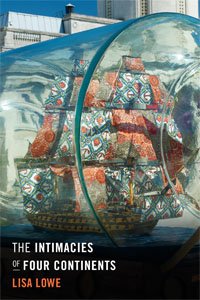“Perhaps it is wrong to speak of it as ‘a concept’ rather than as a group of contradictory forces, facts and tendencies.’ W.E.B. Du Bois, The Concept of Race, 1940: 67 I think this year has got off to a good start on Understanding Race, the Masters course I have…
Comments closedTag: Du Bois
Continuing our focus on racial capitalism, Understanding Race discussed the relationship between race and class with a focus on Race and the Undeserving Poor by Robbie Shilliam. Using the book Futures of Black Radicalism, and in particular the chapter by Nikhil Pal Singh, we explored the limitations of Marxist interpretations of…
Comments closedI was asked by Inference Review to write a response to an article by the German Marxist economist, Wolfgang Streeck, ‘Trump and the Trumpists‘. I thank Inference for the opportunity to write this response which I learnt a lot from. I am also very grateful that so many people have…
Comments closed Lisa Lowe‘s 2015 book, The Intimacies of Four Continents, is the impetus for this week’s blog, the fifth in my Race Critical and Decolonial Sociology series. This groundbreaking work challenges us to unread standard accounts of the development of capitalist modernity and political liberalism. It does not do this only by inserting race, gender and the colonial in order to disrupt these standard accounts. While this work is vital, Lisa Lowe goes several steps further. She reorients official histories by reading the archives against each other and juxtaposes this archaeological work with an unreading of standard texts from literature, autobiography and political philosophy. The Intimacies of Four Continents is not the kind of book that sociologists are used to reading, but neither is it a standard work of history, literature or philosophy as it is profoundly interdisciplinary. The book is an example par excellence of what a relational, interactive or connected account looks like, taking us several steps deeper into the discussion, begun in blogs 3 and 4, about the methodological and epistemological challenges of doing sociology with a truly global orientation.
Lisa Lowe‘s 2015 book, The Intimacies of Four Continents, is the impetus for this week’s blog, the fifth in my Race Critical and Decolonial Sociology series. This groundbreaking work challenges us to unread standard accounts of the development of capitalist modernity and political liberalism. It does not do this only by inserting race, gender and the colonial in order to disrupt these standard accounts. While this work is vital, Lisa Lowe goes several steps further. She reorients official histories by reading the archives against each other and juxtaposes this archaeological work with an unreading of standard texts from literature, autobiography and political philosophy. The Intimacies of Four Continents is not the kind of book that sociologists are used to reading, but neither is it a standard work of history, literature or philosophy as it is profoundly interdisciplinary. The book is an example par excellence of what a relational, interactive or connected account looks like, taking us several steps deeper into the discussion, begun in blogs 3 and 4, about the methodological and epistemological challenges of doing sociology with a truly global orientation.
The Intimacies of Four Continents contains so many multiple layers and such a rich account of interrelated histories that I will be unable to do it justice in its entirety here. I wish instead to focus on three aspects of the book: 1) its methodological contribution, which provides a concrete example of what a truly connected scholarship looks like; 2) most significantly for me, its emplacement of race squarely within liberalism; and 3) its insistence on the impossibility of separating an antiracist, anticolonial praxis from these histories and the consequent scholarship. This third point allows me to build on my comments regarding Du Bois’ activism, begun in my last blog, as Lowe uses Du Bois and C.L.R. James’ work as exemplars of what such active scholarship looks like.
Comments closed



